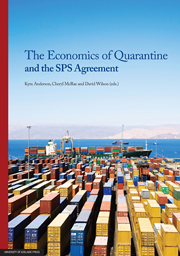Book contents
- Frontmatter
- Contents
- List of tables, figures and boxes
- Acronyms
- Preface
- List of contributors
- 1 Introduction
- PART I The multilateral rules under WTO
- 2 The integration of economics into SPS risk management policies: issues and challenges
- 3 The analytical foundation of quarantine risk analysis
- 4 The WTO dispute settlement framework and operation
- 5 Implications of recent SPS dispute settlement cases
- PART II The ‘appropriate level of protection’
- PART III Adding more economics to risk analysis
- PART IV Specific health and environmental risks from trade
- PART V Conclusion
- APPENDIX The legal text of the SPS Agreement
2 - The integration of economics into SPS risk management policies: issues and challenges
from PART I - The multilateral rules under WTO
Published online by Cambridge University Press: 05 June 2013
- Frontmatter
- Contents
- List of tables, figures and boxes
- Acronyms
- Preface
- List of contributors
- 1 Introduction
- PART I The multilateral rules under WTO
- 2 The integration of economics into SPS risk management policies: issues and challenges
- 3 The analytical foundation of quarantine risk analysis
- 4 The WTO dispute settlement framework and operation
- 5 Implications of recent SPS dispute settlement cases
- PART II The ‘appropriate level of protection’
- PART III Adding more economics to risk analysis
- PART IV Specific health and environmental risks from trade
- PART V Conclusion
- APPENDIX The legal text of the SPS Agreement
Summary
Although many governments are now committed to reducing the number and rigidity of regulations that are thought to stifle economic innovation and competition, it is widely expected that the regulatory environment for agricultural producers and processors will become more complex in the coming years (OECD 1997). Income growth is fuelling demand for food safety and environmental amenities, and media coverage, such as reports on dioxin in European animal feed or on the effects of Bt corn on North American monarch butterfly populations, amplifies the political salience of this demand. On the ‘supply side’ of regulatory activity, officials who devise sanitary and phytosanitary (SPS) measures - regulations that sometimes restrict imports in order to reduce risks to animal, plant, and human health - face additional challenges. These officials are now bound by the multilateral legal obligations found in the Agreement on the Application of Sanitary and Phytosanitary Measures (SPS Agreement) of the World Trade Organization (WTO) which came into force in January 1995. By drawing attention to policies that were generally ignored (even by trade specialists) until the Uruguay Round, the SPS Agreement has had the intended effect of prompting widespread review of SPS measures by regulators and lawyers in both importing and exporting countries, and the unintended effect of begetting policy re-evaluation by others.
Economists in particular have started to scrutinise SPS policies in much the same way that they previously examined other risk-reducing measures, including asbestos removal or toxic waste cleanups. Taken together, these developments have substantially changed the parameters for regulating imports of agricultural products from the time when the maxim “when in doubt, keep it out” was viewed as an appropriate decision rule.
- Type
- Chapter
- Information
- The Economics of Quarantine and the SPS Agreement , pp. 9 - 28Publisher: The University of Adelaide PressPrint publication year: 2012
- 2
- Cited by



